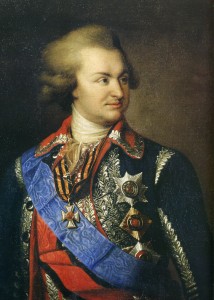Catherine the Great ‘s fame derives from her leadership and rule of Russia during eighteenth-century Russia. Like all autocrats during the time, she received criticism from countless different sources. However, Brenda Meehan-Waters argues that criticisms of Catherine differ along the lines of the sources’ areas of origin. In particular, Meehan-Waters suggests that Western European and Russian writers differ in that “Russian writers viewed her more positively and displayed much less agitation over the female issue. Catherine is desexualized to the extent that she is treaded as an individual rather than as a women.” ((Kaiser, Daniel H. and Gary Marker. Reinterpreting Russian History: Readings 860-1860s. New York: Oxford University Press, 1994. 383-384.))
Meehan-Waters examines the writings from the period of Catherine the Great’s reign. These writings, all published by men, carry various perspectives ranging from foreign ambassadors to Russian leaders to Western philosophers (who were also her patrons) such as Voltaire. One fact becomes clear through these writings – whether they criticized or praised Catherine – Westerners often placed her sex at the center of their ideas while Russian authors rarely commented on it. Western authors would associate her positive characteristics with her masculine side while they portrayed her shortcomings as feminine qualities. ((Kaiser, Reinterpreting, 382.)) While Russian writers such as G.S. Vinsky criticized Catherine, Meehan-Waters notes that such critics not base their qualms on her womanhood. ((Kaiser, Reinterpreting, 382.)) Despite identifying the differentiating narratives coming out of Western Europe and Russia, Meehan-Waters offers little in a reason for why such a difference exists.
Meehan-Waters notes that Russian had many female autocrats throughout the eighteenth century while few existed in Western Europe. Does Russia’s familiarity with empresses explain the lack of emphasis on Catherine’s sex?

This work is in the public domain in its country of origin and other countries and areas where the copyright term is the author’s life plus 70 years or less – from https://commons.wikimedia.org/wiki/File:Princepotemkin.jpg
Potemkin, one of Catherine’s advisors and former lovers, was the center of much scrutiny and debate among her foreign critics. They saw Potemkin as an example of how women were overcome with sexuality and allowed themselves to be dominated by their lovers.
